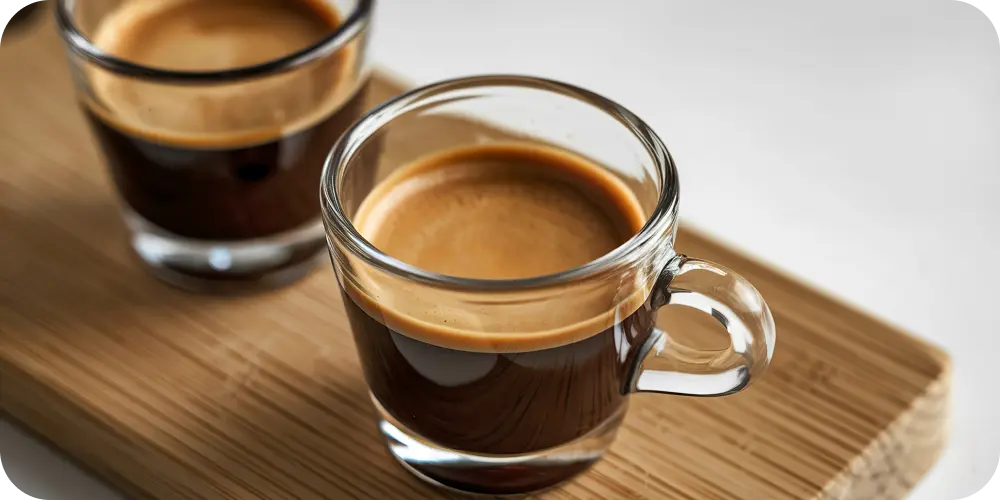Does Coffee Give You Energy?
Mene Mestanas
Yes, coffee does give you energy by blocking adenosine, a chemical that makes you feel tired. This article explains how coffee affects your energy levels, both in the short and long term, and compares it with other caffeinated drinks to see if they also give you energy.
Looking for a natural way to support your energy levels and appetite? Explore Inara’s GLP-1 powder, formulated to work in sync with your body.
Key Takeaways
- Caffeine boosts energy by blocking adenosine receptors, making you feel more alert and reducing drowsiness.
- While coffee offers a significant caffeine kick, moderation is key to avoid tolerance and potential negative side effects like anxiety and insomnia.
- Regular caffeine consumption can enhance cognitive performance and athletic endurance, but overconsumption may lead to dependence and various health issues.
The Role of Caffeine in Energy Levels

Caffeine consumption plays a crucial role in boosting energy levels and mental alertness. As the most commonly used central nervous system stimulant in the world, caffeine impacts the nervous system, making you feel more awake and alert. The energising effects of caffeine can be felt almost immediately and can last for hours after consumption.
One of the reasons caffeine is so effective is that it blocks adenosine, a neurotransmitter that promotes sleep and relaxation. Caffeine prevents drowsiness and maintains alertness by blocking adenosine receptors. This is why many people reach for a cup of coffee when they need to stay awake and focused.
However, it’s important to note that regular caffeine use can lead to tolerance, meaning that over time, the same amount of caffeine will have little effect on your alertness and attention. This is why some people find themselves needing more and more caffeine to achieve the same energising effects.
For more on how your body responds to natural compounds, read our article on how GLP-1 works in the body.
How Coffee Affects Your Brain

Caffeine doesn’t just keep you awake; it has complex effects on your brain, primarily by blocking adenosine receptors. Adenosine levels naturally increase throughout the day, promoting sleepiness. Blocking these receptors helps maintain alertness and delay fatigue.
But the story doesn’t end there. Caffeine consumption also enhances the release of noradrenaline and dopamine, neurotransmitters that are crucial for mood and arousal. This dual effect explains why you often feel more awake and in a better mood after drinking coffee. It’s like a double shot of alertness and happiness in one cup.
Interestingly, caffeine can reduce cerebral blood flow, yet paradoxically increase energy metabolism in brain cells, which can enhance memory. This means that while less blood is flowing to your brain, the brain cells are working more efficiently, contributing to that feeling of mental sharpness.
To naturally support brain and mood balance, you might find our blog on The Ultimate Guide to Cognitive Health, helpful
The Immediate Effects of Drinking Coffee

The effects of coffee can be felt within 5 to 30 minutes, often resulting in an increased heart rate and faster breathing, contributing to heightened alertness. These immediate effects are why many people reach for coffee first thing in the morning or when they need a quick pick-me-up.
Short-term caffeine consumption can also elevate the lower levels of stress hormones like cortisol and adrenaline in your body. While this can be beneficial in boosting your energy levels temporarily, it’s worth noting that too much caffeine can lead to feelings of stress and anxiety. Therefore, moderation is key when consuming caffeinated drinks.
Additionally, using caffeine before workouts can boost fat burning, particularly in sedentary or less active individuals. This makes coffee not just a morning ritual but also a potential aid in your fitness routine. High caffeine consumption can increase heart rate and even cause irregular heart rhythms, especially in young adults consuming energy drinks.
For those seeking smoother energy without the crash, Inara’s GLP-1 powder supports natural appetite regulation and energy balance, without overstimulating your nervous system.
Long-Term Impact on Energy
Regular caffeine consumption can have a significant impact on your long-term energy levels and cognitive performance. A comprehensive review of research suggests that regular caffeine intake can enhance cognitive performance by improving vigilance and reducing fatigue. This means that those who consume caffeine regularly may find themselves more alert and less tired throughout the day.
The energising effects of caffeine can last for up to 12 hours, depending on the individual. Regular caffeine users quickly develop a tolerance to its effects. Over time, more caffeine may be needed to achieve the same level of alertness and energy.
The half-life of caffeine ranges from four to six hours, meaning it can remain active in your body for several hours. Once caffeine’s effects wear off, rebound fatigue may occur, leaving you to feel tired more than before. This is why it’s important to manage your caffeine intake carefully to avoid these energy crashes.
Coffee vs. Other Caffeinated Drinks
When it comes to caffeine content, coffee consumption generally contains more caffeine per serving compared to many teas, making it potentially more effective for energy boosts. For instance, an 8-ounce cup of brewed coffee has about 96 mg of caffeine, while an equivalent serving of brewed black tea only has approximately 48 mg. This makes coffee a more potent choice for those seeking a quick energy boost.
Energy drinks, on the other hand, can vary widely in caffeine content. Typical energy drinks contain around 79 mg of caffeine per 8 oz, but some energy shots can have up to 200 mg. These drinks often contain additional stimulants alongside caffeine, which can enhance their overall energising effects compared to coffee.
Instant coffee has slightly lower caffeine levels than brewed coffee, averaging about 62 mg per 8 oz serving. Decaffeinated coffee still contains a small amount of caffeine, typically around 1 mg per 8 oz, which is significantly lower than standard brewed coffee. This makes decaf a good option for those who want to reduce their caffeine intake without giving up coffee entirely.
In summary, while coffee is a strong contender for providing an energy boost, other caffeinated drinks like energy drinks can offer similar or even higher levels of caffeine. However, the additional stimulants in energy drinks can also come with added risks, so it’s important to choose your caffeinated beverage wisely.
Safe Limits for Caffeine Intake
Understanding safe limits for caffeine intake is crucial for maintaining good health. A maximum of 400 milligrams of caffeine daily is considered safe for most people, equivalent to about four 8-ounce cups of brewed coffee. Pregnant women should limit caffeine intake to less than 200 milligrams per day to avoid potential risks.
Caffeine can exacerbate symptoms in individuals with certain health conditions, so they should consult healthcare professionals regarding their intake. For example, those with anxiety disorders or heart conditions may need to be particularly cautious about their caffeine consumption.
To manage tolerance and avoid needing more caffeine for the same effects, consider reducing your drink intake or consuming it less frequently to decrease the risk of dependence. This can help maintain the benefits of caffeine without leading to dependence or other negative side effects.
Athletic Performance and Caffeine

Caffeine is not just for morning wake-ups; it can also provide noticeable improvements in both physical and mental performance, enhancing focus and fat metabolism during exercise. Research indicates that moderate caffeine intake (1.4–2.7 mg per pound of body weight) can enhance endurance performance significantly.
One way caffeine boosts performance is by increasing the hormone epinephrine, which triggers the body’s ‘fight or flight’ response. This can lead to improved athletic performance, particularly in endurance events. Athletes consuming caffeine prior to endurance events often finish faster than those who do not, with higher doses leading to greater performance benefits.
Caffeine’s impact on high-intensity sports shows more pronounced benefits for trained athletes compared to untrained individuals. However, the beneficial effects of caffeine on exercise performance and caffeine’s effects may diminish with continuous use, indicating a gradual tolerance.
Caffeine may also enhance strength and power output, although evidence on its effectiveness in strength training remains varied. Overall, caffeine can be a valuable tool for athletes looking to boost performance, but it’s important to manage intake to avoid diminishing returns.
Potential Downsides of Too Much Caffeine
While caffeine can initially make you feel energetic, excessive intake may lead to increased anxiety and restlessness. Symptoms of excessive caffeine consumption include rapid heartbeat, dehydration, and insomnia. It’s essential to be mindful of how much caffeine you consume to avoid these negative effects.
High caffeine consumption can also lead to severe side effects, including insomnia, nervousness, and digestive issues. Excessive caffeine can trigger heightened anxiety levels, as it releases adrenaline and can induce jitteriness. This can make it harder to relax and may even impact your mental health over time, especially if you have consumed caffeine, potentially leading to depression.
Furthermore, high caffeine intake may cause several issues:
-
Disrupt sleep patterns, making it harder to fall asleep and reducing overall sleep duration.
-
Cause digestive issues, including diarrhea, due to its stimulant effects on the gastrointestinal tract and stomach.
-
Lead to frequent urination, as it stimulates the bladder.
Caffeine withdrawal symptoms can appear after a short period without intake, suggesting a quick development of dependence. High doses of caffeine can lead to physiological dependence, where individuals may feel compelled to consume caffeine to avoid withdrawal symptoms. This highlights the importance of consuming caffeine in moderation to avoid these potential downsides.
Summary
In summary, caffeine plays a significant role in boosting energy levels and mental alertness by stimulating the central nervous system and blocking adenosine receptors. While its immediate effects can be felt within minutes, regular consumption can lead to tolerance and rebound fatigue. Coffee, with its higher caffeine content, often serves as a more potent energy booster compared to other caffeinated drinks.
However, it’s essential to be mindful of safe caffeine limits to avoid negative side effects like anxiety, insomnia, and digestive issues. Whether you’re an athlete looking to enhance performance or someone seeking a morning boost, understanding how caffeine works can help you make informed choices. Enjoy your cup of coffee, but remember to consume it wisely.
Frequently Asked Questions
How does caffeine increase energy levels?
Caffeine boosts your energy by stimulating your central nervous system and blocking adenosine receptors, which helps keep fatigue at bay. So, if you're feeling sluggish, a cup of coffee might be just what you need!
What is the safe amount of caffeine to consume daily?
You can safely enjoy up to 400 milligrams of caffeine each day. Just keep an eye on how your body reacts to it!
Can caffeine improve athletic performance?
Absolutely, caffeine can boost athletic performance by sharpening your focus and helping your body burn fat more efficiently during workouts. So, if you're looking to enhance your game, a little caffeine might just do the trick!
What are the side effects of too much caffeine?
Consuming too much caffeine can lead to anxiety, insomnia, and digestive problems. It's best to watch your intake to avoid these unpleasant side effects!
Is coffee better than energy drinks for an energy boost?
Coffee is often a better choice than energy drinks for an energy boost because it typically contains fewer additional stimulants. Just keep in mind your caffeine tolerance and any health considerations!



